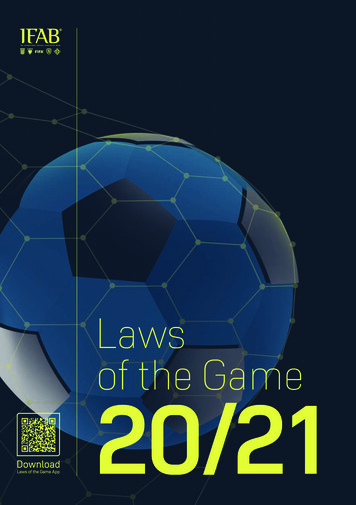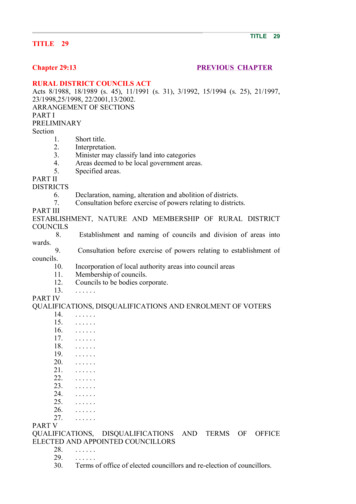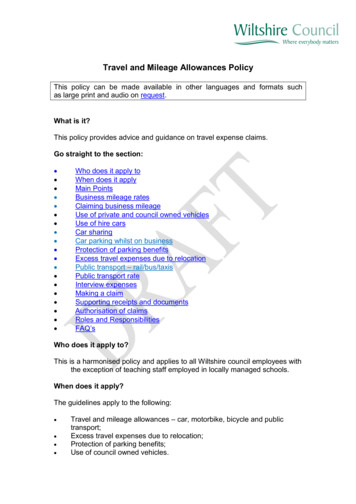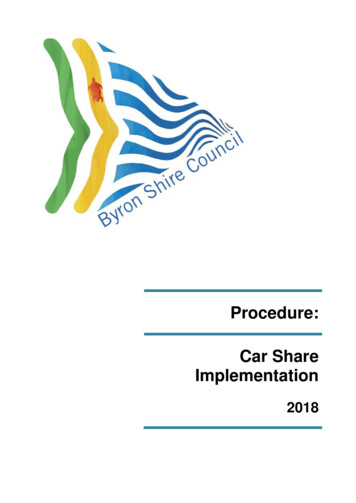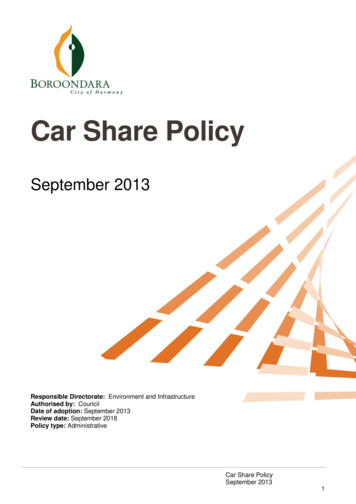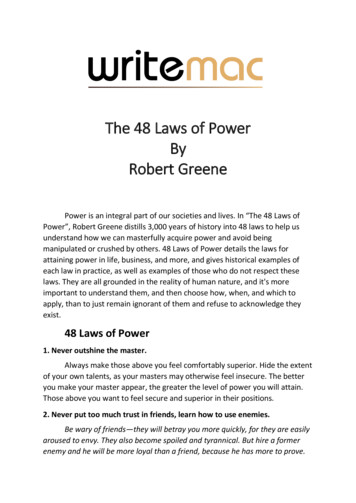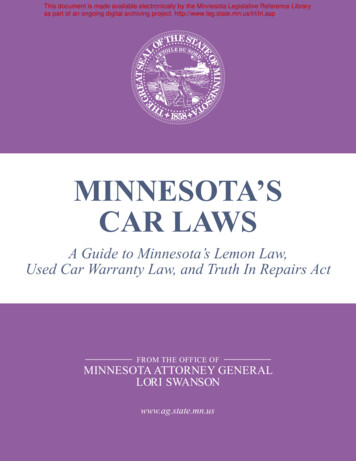
Transcription
This document is made available electronically by the Minnesota Legislative Reference Libraryas part of an ongoing digital archiving project. SCAR LAWSA Guide to Minnesota’s Lemon Law,Used Car Warranty Law, and Truth In Repairs ActFROM THE OFFICE OFMINNESOTA ATTORNEY GENERALLORI SWANSONwww.ag.state.mn.us
Are you having trouble with a new car you just bought? Is your“new” used car making strange noises? Have you had troublewith a repair shop?This brochure is designed to guide you through Minnesota’s lemon law, usedcar warranty law, and Truth in Repairs Act. Buckle your seat belt, this is goingto be a quick ride through “Car Law 101.”This brochure is intended to be used as a source for generalinformation and is not provided as legal advice.Minnesota’s Car Laws is written and published by the Minnesota AttorneyGeneral’s Office. This handbook is available in alternate formats upon request.The Minnesota Attorney General’s Office values diversity and is an equalopportunity employer.Office of Minnesota Attorney General Lori Swanson445 Minnesota Street, Suite 1400, St. Paul, MN 55101(651) 296-3353 (Twin Cities Calling Area)(800) 657-3787 (Outside the Twin Cities)TTY: (651) 297-7206 or (800) 366-4812www.ag.state.mn.usOFFICE OF THE MINNESOTAATTORNEY GENERAL
Table of ContentsMinnesota’s Lemon Law. 2Which Motor Vehicles Are Covered?.2The Manufacturer’s Duty to Repair.2The Manufacturer’s Duty to Refund or Replace.3When Refunds or Replacements Are Not Given.3Refund and Replacement Eligibility Requirements.3If You Are Awarded a Refund.4Arbitration.4Using the Lemon Law in Arbitration or Court.6Arbitration Program Telephone Numbers.7There Is No Three-Day Right to Cancel.8Used Car Warranty Law. 9“As Is” or Warranty.9The Basic Used Car Warranties.9Who Provides a Used Car Warranty?.10“Unlicensed” Dealers.10Exclusions.10The “Buyers Guide”.11The Dealer’s Duty Under the Warranty.11Refunds .12Ordinary Maintenance.12Limits on the Warranty.12Bringing a Lawsuit.12Know the Difference Between Service Contractsand the Used Car Warranty Law.13Truth In Repairs Act. 14Your Rights When Your Car Is Repaired.14Resolving Repair Disputes.15Salvaged Cars.15Resouces. 16MINNESOTA’S CAR LAWS1
Minnesota’s Lemon LawPopularly known as the “lemon law,” Minnesota’s motor vehiclewarranty statute was created to help protect you when you buyor lease a car, pickup truck, or van that is still under the originalmanufacturer’s warranty. The law is not intended to eliminate allproblems you will ever encounter with your vehicle. What it does do is requiremanufacturers to honor the time and mileage provisions of their writtenwarranties. The law also provides special arbitration, refund, and replacementprovisions for vehicles that are considered to be real “lemons.”Which Motor Vehicles Are Covered?The Minnesota lemonThe Minnesota lemon law covers new and lightly used motorlaw covers motorvehicles purchased or leased in Minnesota. The law covers passengervehicles purchased orautomobiles, as well as pickup trucks and vans. The motor vehicle chassis orleased in Minnesota stillvan portion of a recreational vehicle (RV) is also covered. That means that ascovered by the originallong as the “lemon” problem occurs in portions of the chassis and van coveredmanufacturer warranty.by the warranty, the entire RV may be subject to replacement or refund. It doesnot cover other areas, such as living areas or other amenities, that may havebeen added to the chassis by the RV manufacturer. It also covers used vehiclesthat are still under the original manufacturer’s warranty. The vehicles must beused at least 40 percent of the time for personal, family, or household purposes(leased vehicles are covered by the law if the lease term is longer than fourmonths).The first report of a defect must occur within the warranty period, or two years,whichever comes first. If you have continuing problems with the same defect,however, you still can make a claim until the end of the third year.The Manufacturer’s Duty to RepairThe manufacturerThe manufacturer or its authorized dealer must repair a motor vehicle inmay have a duty toaccordance with the terms of the warranty, even after the manufacturer’srepair the vehicle.warranty has expired, if:1. The motor vehicle has a defect or problem that is covered by thewarranty; and,2. The problem has been reported by the vehicle’s owner within thewarranty period, or within two years after original delivery of thevehicle, whichever comes first.OFFICE OF THE MINNESOTAATTORNEY GENERAL2
The Manufacturer’s Duty to Refund or ReplaceThe law has special refund and replacement provisions for cars that haveThe manufacturer maysubstantial defects or problems. Such vehicles are commonly called “lemons.”have a duty to replaceUnder the law, if the manufacturer or its authorized dealer has been unable toor provide a refundrepair a car’s problem after a “reasonable number of attempts,” the buyer orregarding the vehicle.lessee may go through a manufacturer’s arbitration program, or to court, toseek a replacement vehicle or a full refund of the car’s purchase price (minusa deduction for use of the vehicle). The law presumes a “reasonable number ofattempts” to include any one of the following:1. Four or more unsuccessful attempts to repair the same defect; or,2. One unsuccessful attempt to repair a defect that has caused the completefailure of the steering or braking system and that is likely to cause deathor serious bodily injury; or,3. A car that has been out of service due to warranty repairs for 30 or morecumulative business days.In each case, the initial defect must occur within the warranty period, or twoyears following the original delivery date, whichever comes first, but themanufacturer’s repair attempts may extend to the end of the third year. Even ifyour repair history does not fall into one of the above categories, you may stillhave a lemon law claim, but it will be harder to prove.When Refunds or Replacements Are Not GivenBe aware that the manufacturer does not have to make a refund or replace thevehicle if: The problem does not substantially impair the use or market value ofthe vehicle; or, The problem is the result of abuse, neglect, or unauthorized modificationsor alterations to the vehicle.Refund and Replacement Eligibility RequirementsJust because a repair shop has made a number of unsuccessful attempts tofix your car, you are not automatically eligible for a refund or replacementvehicle. You must first: Write to the manufacturer or authorized dealer notifying them of theproblem. Specifically state that your car is a lemon and that you want arefund or replacement under the lemon law. This does two things:1.It gives the company an opportunity to fix the defect (themanufacturer gets one more chance to fix the defect afternotification); and,MINNESOTA’S CAR LAWS3
2.It lets the company know you plan to use Minnesota’s lemon lawif the defect is not properly repaired. Try to resolve the problem through the manufacturer’s automobiledispute arbitration program.The manufacturer may require you to first go through the arbitration programbefore filing a lawsuit under the lemon law. Check with the manufactureror the Minnesota Attorney General’s Office if you have questions about amanufacturer’s arbitration program.If You Are Awarded a RefundIf you are awarded a refund under the terms of the lemon law, the manufacturermust refund:1. The full purchase price of the vehicle, or the amount you actually paidon your lease. For either a purchased or leased vehicle, however, areasonable allowance for the time that you were able to use the vehiclemay be deducted. This deduction cannot exceed 10 cents per mile or 10percent of the purchase price, whichever is less;2. The cost of certain options installed by the manufacturer or dealer;3. Sales or excise tax;4. License fees;5. Registration fees;6. Reimbursement for towing; and,7. Rental expenses.Note: If you are awarded a replacement vehicle, you have the option ofreceiving a refund instead.ArbitrationAutomobile manufacturers doing business in Minnesota must offer consumersan arbitration program located in the State of Minnesota that considersconsumers’ warranty related disputes.A manufacturer’sA manufacturer’s arbitration program provides consumers a fastarbitration programand simple way to resolve disputes. Arbitrators can consider argumentsprovides consumers abased on the lemon law. That being said, an arbitrator is not a judge and is notfast and simple way torequired to apply the law the way a court would.resolve disputes.If the manufacturer requires it, consumers must first go through themanufacturer’s arbitration program before filing a lawsuit under the lemonlaw. You may not have to wait until all the lemon law criteria are met beforegoing through arbitration, but you might have a stronger case if all the criteriaOFFICE OF THE MINNESOTAATTORNEY GENERAL4are met.
In fact, you may not even want to discuss the lemon law in arbitration if yourcar does not meet the lemon law criteria.Consumer Rights During the Arbitration Process: Lemon Law Information. You and the arbitrator(s) must receive aThe consumer hascopy of this brochure from the manufacturer’s arbitration program.many rights during theLemon Law Arguments. You may make any arguments to thearbitration process.arbitrator(s) you think necessary to support your complaint, includingthose based on the lemon law. The arbitrator(s) cannot be discouragedor prohibited from considering your arguments. Documents. You are entitled to copies of all documents submitted tothe arbitration program and have the opportunity to comment on anydocuments produced. You can request postponement of an arbitrationmeeting if documents are presented to you at the meeting that havenot been previously provided to you. Oral Presentation. You must be given reasonable written notice ofthe arbitration and an opportunity to make an oral presentation to thearbitrator(s), unless you agree to a telephone conference or to submit thecase on the basis of documents alone. If the case is based on documentsalone, the manufacturer or dealer representative cannot participate indiscussion or resolution of the dispute. You may get better results if youmake a personal oral presentation to the arbitrator(s). Independent Appraisal. You must be given an adequate opportunityto get an independent appraisal, at your own cost, of any manufacturerclaim that your vehicle does not have a problem or that your vehicle isoperating within normal specifications. Repair Attempts. You must be given a chance to inform thearbitrator(s) about the results of any recent repair attempts by themanufacturer. Service Bulletins. You must be provided, at reasonable cost, anytechnical service bulletin that the manufacturer knows directly appliesto the specific mechanical problem being disputed. Attorney. You have the right to be represented by an attorneyin the arbitration process. Most arbitration participants, however,appear before the arbitrator(s) without an attorney. Attorney fees forrepresentation in arbitration are not recoverable under the lemon law.MINNESOTA’S CAR LAWS5
Arbitration Decision. You are not bound by the decision of thearbitrator(s), unless you agree to be bound. That being said, manymanufacturers have agreed to be bound by the arbitration decision.If you are unhappy with an arbitration decision, you may wish toconsult an attorney to discuss filing a lawsuit under the lemon law.The arbitration decision is admissible as nonbinding evidence in anysubsequent legal action.If you wish to appeal the arbitrator’s ruling in court, youIf you wish to file anmust file in court within six months of the decision.appeal of the arbitrator’sruling in court, you mustfile in court within six Refund Amount. If the arbitrator(s) decides you should receive arefund or replacement vehicle under the terms of the lemon law, thenmonths of the decision.you are entitled to the same refunds and reimbursements you wouldhave received had you won in court. Bad Faith Appeal. If a court determines that you or the manufactureracted in bad faith when you appealed an arbitration decision, the partythat wins in court may be entitled to receive three times the actualdamages, plus attorney fees and court costs.There are several thingsyou should do to preparefor arbitration or court.Using the Lemon Law in Arbitration or CourtTo prepare for a dispute you should:1. Keep copies of all purchase orders, sales receipts, lease agreements,warranties, repair invoices, letters, and other documents concerningyour vehicle and any of its problems or potential defects.2. If your vehicle is in the shop for repairs for more than one day at a time,make sure that the repair invoice shows the date it was brought in andthe date you were notified that it was ready to be returned.3. If you think you are eligible for a refund or replacement vehicle,remember the law requires written notice be given to the manufactureror authorized dealer. You should send a letter by certified mail witha return receipt requested. If you send the letter to the dealer, send acopy to the manufacturer and keep a copy for your records. You shouldinclude the following information in your letter:OFFICE OF THE MINNESOTAATTORNEY GENERAL6 Your name, address, and telephone number. The date you purchased or began leasing the automobile. A list of defects and systems affected. The number of times the vehicle has been subject to repairs forthe same problem, and the dates of the repairs.
A statement that the defect still exists as of the date of the letter. A reference to the lemon law (Minnesota Statutes section325F.665) and a statement that you will pursue a replacementor refund claim under this law if the vehicle is not made toconform to the warranty. A request for information about the company’s arbitrationprogram.Remember, the refund and replacement provisions of the lemon law areintended to provide a replacement or a refund only in the cases of the mostserious defects faults that substantially impair the use or market value ofthe vehicle, or faults that involve life-threatening failures of the braking andsteering systems.If You SueFor more informationIf you feel you must bring a lawsuit under the lemon law for a refund orabout Minnesota’s lemonreplacement vehicle, you should consult an attorney (you may be eligible tolaw, visit our website atrecover attorney fees if you win). The law allows you to file suit any timewww.ag.state.mn.us.within three years of the date of the original delivery of the vehicle, if you firstreported the defect within the warranty period, or two years, whichever comesfirst. If you go through a manufacturer’s arbitration program, you have sixmonths to appeal in court. The company has only 30 days to appeal in court.Arbitration Program Telephone NumbersThese numbers are accurate as of April 2017. If the listed program no longerworks with your manufacturer, check your owner’s manual, or call your dealeror manufacturer for updated information.Better Business Bureau’sMitsubishiAuto Line Arbitration Program(866) 662-8119(see list of manufacturers below)(800) 955-5100FCA US(Chrysler, Dodge, Fiat, Jeep, Ram)(866) 662-4639Toyota (Lexus)(800) 777-8119Porsche(800) 279-5343Suzuki(866) 662-4639Tesla(866) 629-3204MINNESOTA’S CAR LAWS7
The following manufacturers and distributors currently participatein arbitration programs administered by the Better BusinessBureau: Acura, Audi, Bentley (Rolls-Royce), BMW, Ducati, Ford Motors(Ford, Lincoln, Mercury), General Motors (Buick, Cadillac, Chevrolet, GMCTruck, Pontiac, Saturn), Honda, Hyundai, Infiniti, Jaguar, Kia, Lamborghini,Land Rover, Lotus, Maserati, Mazda, Mercedes-Benz, Mini Cooper, MobilityVentures (AM General), Nissan, Oldsmobile, Subaru, Volkswagen, and Volvo.There Is No Three-Day Right to Cancel.If we could impart just one piece of information, it would be to remind you thatthere is no three-day right to cancel a car contract. Once you sign on the dottedline, the car is yours. The Minnesota Attorney General’s Office hears frommany consumers every Monday morning who assume they can still returnRemember: there is nothe car they bought Friday night. They can’t, and have to learn this lessonthree-day right to cancelthe hard way. So, don’t be one of our remorseful Monday morning callers—a car contract.OFFICE OF THE MINNESOTAATTORNEY GENERAL8remember: when you buy a car, it’s yours!
Used Car Warranty LawMinnesota has one of the strongest used car warranty laws in theMinnesota has onecountry. Under the Minnesota used car warranty law, Minn. Stat. § 325F.662,of the strongest usedused car dealers must provide basic warranty coverage for most used cars andcar warranty laws insmall trucks sold to Minnesota buyers. The used car warranty law does notthe country.apply if you buy a used car from a relative or friend, from a private party, or“as is.”“As Is” or WarrantyWhether your car will come with a warranty generally depends on whetheryou buy a car covered under the used car warranty law. A car sold withouta warranty is sold “as is.” That means the seller has no obligation to fix anyproblem that may arise. Check the Buyers Guide window sticker todetermine if you will receive a warranty. That sticker will tell you if youhave a warranty, or if you are buying “as is.”The Basic Used Car WarrantiesThe used car warranty law covers used cars purchased primarily for personal,family, or household purposes. The terms and length of the warranty willdepend upon the mileage on the car at the time you buy it. For cars withfewer than 36,000 miles, the warranty applies for 60 days or 2,500miles, whichever comes first. The parts covered under the warranty forcars in this mileage range are: Engine: all lubricated parts, intake manifolds, engine block, cylinderhead, rotary engine housings, and ring gear. Transmission: automatic transmission case, internal parts, andtorque converter; or, manual transmission case and internal parts. Many parts arecovered by the usedcar warranty laws.Drive axle: axle housings and internal parts, axle shafts, driveshafts, output shafts, and universal joints. (Secondary drive axles arecovered on automobiles and passenger vans, but are not covered onother vehicles mounted on a truck chassis, such as utility and off-roadvehicles.) Brakes: master cylinder, vacuum assist booster, wheel cylinders,hydraulic lines and fittings, and disc brake calipers. Steering: steering gear housing and all internal parts, power steeringpump, valve body, piston, and rack. Water pump. Externally mounted mechanical fuel pump. Radiator. Alternator, generator, and starter.MINNESOTA’S CAR LAWS9
For cars with between 36,000 and 75,000 miles, the warrantyapplies for 30 days or 1,000 miles, whichever comes first. For carsin this mileage range, the warranty covers the parts listed above, except for thefollowing parts, which are not covered: Rack. Radiator. Alternator, generator, starter.Parts are not covered under the used car warranty law if theyare not specifically listed above.The used car warrantylaw applies only if youbuy your car from aused car dealer.Who Provides a Used Car Warranty?The used car warranty law applies only if you buy your car froma used car dealer. The law does not apply if you buy a used car from arelative, friend, or neighbor. Nor does the law apply if you buy your car from: Your employer;A bank or financial institution;A company that previously leased the car to you or a family member;The state, or any county or city in Minnesota; orAn auctioneer who sells the car in connection with the sale of otherproperty or land.“Unlicensed” DealersOne problem the used car warranty law addresses is the problem of “unlicenseddealers.” State law says that any person who is in the business of selling usedcars and who sells more than five used cars in a year is a “dealer,” and mustobtain a dealer’s license. An unlicensed dealer is a person who sells morethan five used cars in a year but fails to get a dealer’s license. Typically, anunlicensed dealer sells cars one at a time from the unlicensed dealer’s home orIf you buy a qualifyingbusiness. If you buy a qualifying car from an unlicensed dealer, thencar from an unlicensedyour car is covered by the used car warranty law. In such a case, youdealer, then your carare legally entitled to warranty coverage even if the unlicensed dealer fails tois covered by the usedcar warranty law.give you any written warranty documents.ExclusionsRemember that the used car you buy might not be covered by the used carwarranty law. The following cars are excluded from the law, and although adealer may still choose to offer a warranty, these cars are usually sold “as is:”OFFICE OF THE MINNESOTAATTORNEY GENERAL10 Cars with 75,000 miles or more; Cars sold for less than 3,000; Custom-built cars, or cars modified for show or racing;
Cars that are eight years of age or older; Cars purchased primarily for business or agricultural use; Vehicles with a gross vehicle weight of more than 9,000 pounds; Vehicles manufactured in limited quantities; Vehicles not manufactured in accordance with federal emissionstandards; Diesel engine vehicles; and Salvaged vehicles.The “Buyers Guide”A federal rule requires that dealers post a notice called a “BuyersReview the “BuyersGuide” in the side window of all used cars offered for sale. If a carGuide” sticker in theis covered by the state’s used car warranty law or another warranty, then thewindow for informationdealer must check the “dealer warranty” box on the Buyers Guide. The dealerabout the car.must also describe the terms and length of the warranty on the Buyers Guide.If a car is not covered by the warranty law and no warranty is offered, then the“as is—no dealer warranty” box must be checked.Even if the car you buy is covered under the used car warranty law, you maywaive warranty coverage for a particular part. In order for warranty coverageto be waived, the dealer must disclose on the Buyers Guide that the part is notworking properly, and you must sign and circle this statement.The Dealer’s Duty Under the WarrantyIf a malfunction, defect, or failure in a covered part occurs duringIf a malfunction, defect,the warranty period, then the dealer must repair or replace theor failure in a coveredpart at no charge to the car buyer. However, to protect your rights underpart occurs during thethe warranty, you must promptly notify the dealer of the problem within thewarranty period, thenwarranty period, and you must arrange to have the vehicle taken to the dealerthe dealer must repairfor inspection and repair.or replace the part at noIf the dealer does not have a repair facility, the dealer will tell you where tocharge to the car buyer.take the vehicle for inspection and repair under the warranty. If it is impossibleor unreasonable to return the vehicle to the dealer, you may have the repairsdone somewhere else with the dealer’s consent. If a part is repaired or replacedunder the car’s warranty, the warranty for that part is extended from the date ofrepair for an additional warranty period.For example, if your car’s transmission is repaired under its used car warranty,then the transmission remains under warranty for an additional 30 days or1,000 miles (or 60 days or 2,500 miles) from the date of the repair.MINNESOTA’S CAR LAWS11
The dealer is not responsible for any malfunctions, defects, or failures thatoccur after the warranty period expires, nor is the dealer responsible for repairof parts not covered by the warranty.RefundsA dealer may decide to refund the purchase price of your car,rather than repair or replace a warranty part. If the dealer gives youa refund, you must return the vehicle to the dealer. The refund must includeall the charges , fees, and taxes you paid, including towing expenses, minus areasonable deduction for your use of the vehicle.Remember that the dealer has the choice of correcting the warranty problemor giving you a refund; the law does not give the car buyer the right to demanda refund of the purchase price.Ordinary MaintenanceA warranty given under the used car warranty law does not cover ordinarymaintenance of your car. Thus, repair or replacement of maintenance items(such as spark plugs, ignition points, filters, fluids, lubricants and oil, andbrake pads) is your responsibility. The warranty does not cover normal wearand tear.Limits on the WarrantyThere are someThe warranty does not cover any repair problems caused by collisions, abuse,limitations on thenegligence, or lack of adequate maintenance after you buy the car. The dealerused car warranty.is not required to repair any parts still covered by the original factory warranty,or parts that the manufacturer agrees to repair at no charge.Bringing a LawsuitIf a used car dealer fails to comply with the warranty law, you may bring alawsuit against the dealer. Any lawsuit under the used car warranty law mustbe brought within one year after the warranty expires.Often, you will be able to bring your case in conciliation court, where theprocedures are relatively informal and you will not be required to hire anattorney.Much of the expense of owning a car comes after you buy it. After three or fouryears of driving, the muffler may roar, the brakes may grind, the windshieldwiper fluid may leak, or the radio may go out. Slowly but surely, your vehiclewill begin to show signs of age. As Murphy’s Law says, “anything that can goOFFICE OF THE MINNESOTAATTORNEY GENERAL12wrong, will go wrong” just after the warranty has run out!
Know the Difference Between Service Contractsand the Used Car Warranty LawIf you are offered an “extended warranty” at an additional cost, this is probablya service contract, not a warranty. Service contracts provide limited coveragefor the car, so you should read the service contract carefully before decidingwhether you want to buy this coverage. Furthermore, the service contract mayrequire you to prove that you completed regular maintenance (oil changes,etc.) on the vehicle or obtain pre-approval before a repair is made. You shouldalso be aware that a service contract is frequently a profit item for the dealer;like any other add-on, the cost may be negotiated.For additional information about motor vehicle service contracts, see MotorVehicle Service Contract Offers published by the Minnesota AttorneyGeneral’s Office.For moreinformation aboutservice contracts,see Motor VehicleService ContractOffers published bythe Minnesota AttorneyGeneral’s Office.MINNESOTA’S CAR LAWS13
Truth in Repairs ActYour Rights When Your Car Is RepairedKnow your rightsMinnesota’s Truth in Repairs Act (Minn. Stat. §§ 325F.56–325F.66)before you take yourspells out the rights and obligations of repair shops and theircar in for repairs.customers for repairs that cost more than 100 and less than 7,500.Know your rights before you take your car in for repairs: You have the right to receive a written estimate for repair workbefore the work commences, if you request one. A shop may imposean additional charge for making the estimate, including a charge fordisassembly, diagnosis, and reassembly needed to make the estimate, ifthe customer is told about the charge before the estimate is issued. Once you receive this estimate, the shop generally may not charge morethan 10 percent above the estimated cost. The shop is required to provide you with an invoice if the repairscost more than 50, and/or the work is done under a manufacturer’swarranty, service contract, or an insurance policy. The shop cannot perform any unnecessary or unauthorized repairs. If,after repairs are begun, a shop determines that additional work needs tobe done, the shop may exceed the price of the written estimate, but onlyafter it has informed you and provided you with a revised estimate. Ifyou authorize the additional work, the shop may not charge more than10 percent above the revised estimate. Before the shop actually begins repairs, you have the right to ask forand receive replaced parts, unless those parts are under warranty orother restrictions. In that case, they must be returned by the shop to themanufacturer, distributor, or other person. You may pay an additionalcharge for retrieving parts because the shop usually can sell them.However, if you are not allowed to keep the old parts you will have anopportunity to examine
Minnesota's Lemon Law Popularly known as the "lemon law," Minnesota's motor vehicle warranty statute was created to help protect you when you buy or lease a car, pickup truck, or van that is still under the original manufacturer's warranty. The law is not intended to eliminate all problems you will ever encounter with your vehicle.
